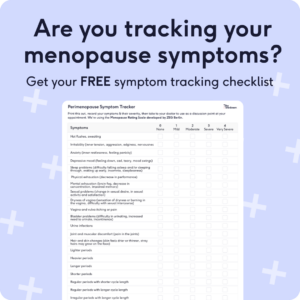Cerelle and the Menopause: Can the Pill Help?
What's the lowdown?
The Cerelle pill is safe to use during the perimenopause as contraception
Cerelle can cause your periods to stop, so you may need help from your healthcare professional or a blood test to work out when you can stop taking Cerelle as contraception
Cerelle can be used alongside HRT for contraception and may help some of the symptoms of the perimenopause
Some menopause specialists may use Cerelle as part of HRT.
Cerelle and the menopause: your questions answered
The menopause is the moment when your periods have stopped for at least the last 12 months. Before this day, you are perimenopausal, then after the menopause, you become postmenopausal. The time it takes to transition from perimenopause to postmenopause can take on average 4 years, but this may vary from a few months in some women to a decade for others. The average age to reach menopause in the UK is 51.
This time of your life can cause a wide range of new feelings including physical, psychological and emotional symptoms which vary in their severity and how they can affect you. The perimenopause and menopause may sound daunting, but thankfully awareness has been increasing over recent years and now it is much easier to find information and support.
Can you take Cerelle during the menopause?
You can take the Cerelle pill during the menopause. Cerelle is a progestogen-only pill which is used as a contraceptive and can also be used as a treatment for women’s health problems including heavy or painful periods. It is safe to take for the majority of people. Cerelle can be used at all stages of the menopause and is often continued until the age of 55, when it is assumed that contraception is no longer needed. You can order the pill online through The Lowdown until the age of 55.
How will I know if I’ve reached menopause whilst taking Cerelle?
To know if you have reached menopause whilst taking Cerelle, you will need to be aware of any new symptoms or changes in your body. You can still go through menopause on the pill. However, it may be more difficult to notice as some people do not have periods or have irregular bleeding while using the pill, masking some typical features of perimenopause.
Even while using Cerelle, you may experience perimenopausal symptoms such as hot flushes, changes in sleep, libido or mood, palpitations or anxiety. If you feel that these symptoms are new or different for you, speak to a healthcare professional. Healthcare professionals can often diagnose perimenopause based on your symptoms alone.
However, if you are over the age of 50 and on Cerelle, a blood test called FSH may be taken to help decide when you can stop contraception before the age of 55. [1]
FSH is a hormone which is important in the menstrual cycle. It will become raised after the menopause but can fluctuate up and down during the perimenopause, meaning it can be inaccurate until your periods have definitely stopped. For this reason, FSH blood tests are only used to help decide when you can stop contraception if you are over 50 and do not have periods on Cerelle. If the FSH level is raised, Cerelle should initially be continued but then can be stopped after 1 year. Otherwise Cerelle should be continued and the FSH level checked again 1 year later. [1]

Can I take Cerelle with HRT?
You can take Cerelle with HRT (hormone replacement therapy). HRT does not provide contraception unless you use the Mirena, Levosert or Benilexa hormonal coils as part of the HRT. [2] You can still fall pregnant during the perimenopause, so it is important to use birth control until the age of 55 or, if you are not on hormonal contraception, until your periods have stopped for at least 12 months if you are over 50, or for 2 years if you are under 50. [1] Cerelle can be prescribed alongside HRT as your contraceptive.
Occasionally, some menopause specialists will suggest 2 Cerelle tablets daily as part of HRT, however, this is an off licence treatment and not routinely prescribed.
When shouldn’t you take Cerelle?
You shouldn’t take Cerelle if you have breast cancer or have had breast cancer in the past. If you carry the BRCA gene, the benefits of taking Cerelle generally outweigh any small risks of breast cancer and you can currently take it.[3]
You shouldn’t take Cerelle if you have liver conditions including severe cirrhosis, a hepatocellular adenoma (a type of benign liver tumour) or cancer of the liver. [3]
You should also stop taking Cerelle if you develop angina, have a heart attack or have a stroke or mini stroke while using it. [3]
If you have any of these conditions or are concerned about the safety of Cerelle for you, speak to your healthcare professional or book in with our fabulous doctors who provide individual women’s health advice.
Does Cerelle help with menopause symptoms?
Cerelle can help with some perimenopausal symptoms, but most of the symptoms of perimenopause are improved by replacing oestrogen which is not found within Cerelle or other progestogen-only pills.
Heavy Bleeding
Heavy bleeding is a common symptom of perimenopause. Cerelle can help with this. A benefit of Cerelle and other mini pills is thinning of the womb lining which means periods can often become lighter.
Irregular Bleeding
Irregular bleeding is a hallmark feature of the perimenopause. For some women, Cerelle can cause bleeds to become more irregular, however, for many other women periods can completely stop, which can be very welcome!
Can the progestogen-only pill be used for HRT?
The progestogen-only pill may be used for HRT by some individuals, but only when recommended by menopause specialists who have expertise in doing so. The progestogen-only pill is not licensed to be used as HRT. This means the original clinical research did not test if it was safe or effective as part of HRT. However, some menopause specialists may prescribe a double dose of a progestogen-only pill such as Cerelle or even a triple dose of a different progestogen-only pill such as Noriday or Micronor. This is very specialised and should not be tried unless under an experienced menopause doctor.
Some women may even find that their perimenopausal symptoms improve while taking a progestogen-only pill without using HRT. This just demonstrates how different we all are as individuals, and trying Cerelle for your symptoms is unlikely to do any harm.
Do you still produce oestrogen on the mini pill?
Yes, you still produce oestrogen on the mini pill.
Does the mini pill reduce estrogen?
The mini pill, such as Cerelle, works by stopping ovulation (release of an egg). This can cause a small reduction in the amount of oestrogen circulating in your bloodstream throughout your cycle, however, in most women this does not cause significant symptoms.
Summary
The perimenopause and menopause can be a tricky time of a woman’s life. Progestogen-only pills like Cerelle can be used safely throughout menopause for contraception and their benefits in treating period symptoms associated with perimenopause. Cerelle is safe and easy to start and stop.
If you have any worries or questions about the menopause, symptoms and contraception, The Lowdown’s women’s health doctors can help.
Our medical review process
This article has been medically reviewed for factual and up to date information by a Lowdown doctor.

